Egypt History
Egypt History – Discover the fascinating history of Egypt, from ancient pharaohs to modern times. Explore pyramids, mummies, and the rich cultural legacy of this iconic civilization.
egypt History
Egypt is a land full of history that has amazed people for thousands of years. It’s home to the famous pyramids of Giza and the mysterious Sphinx. This ancient civilization has greatly influenced human history.
Let’s dive into Egypt’s past. We’ll look at the rise and fall of its powerful pharaohs. We’ll also explore the world of its gods and goddesses. And we’ll see how its culture still affects us today.
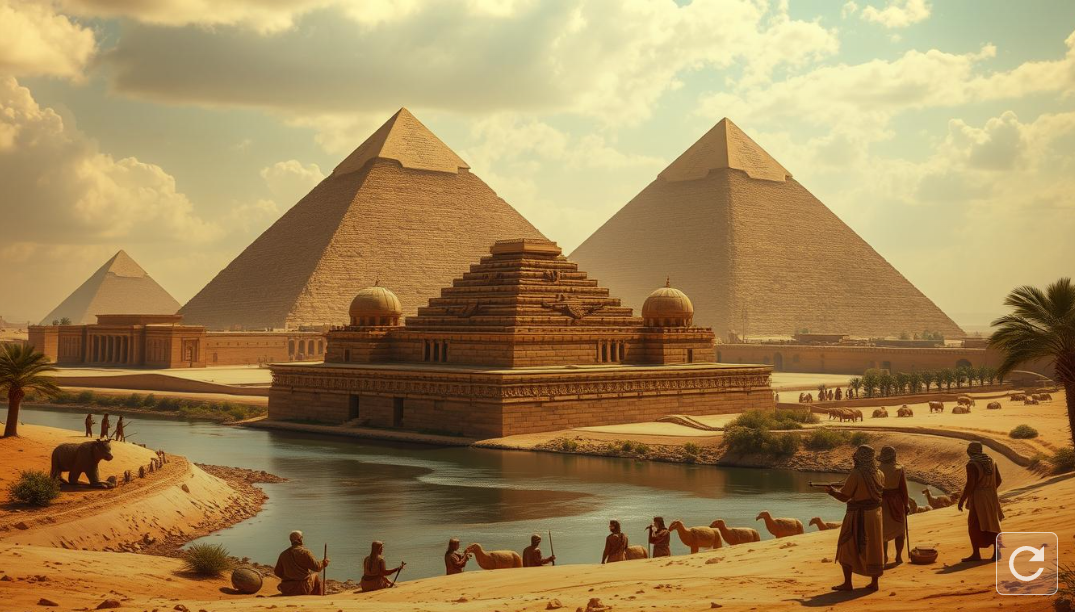
Key Takeaways
- Egypt is famous for its ancient civilization, with a history that goes back thousands of years.
- The pyramids of Giza and the Sphinx are symbols of Egypt’s rich culture.
- The pharaohs and their gods were key in shaping Egyptian society and beliefs.
- Egypt’s culture, from art and architecture to science and technology, has made a big impact on the world.
- Visiting museums and archaeological sites in Egypt lets us see its lasting legacy.
The Ancient Roots of Egyptian Civilization
Ancient Egypt, a land famous for its rich history, started in the fertile Nile Valley. This area, in the heart of the continent of Africa, helped create one of the world’s most powerful civilizations.
The Fertile Nile Valley and Its Influence
The Nile River flooded every year, making it perfect for farming. The soil was rich and the water was always there, letting the ancient Egyptians grow many crops. This gave them a steady food supply and helped their economy grow.
The Nile Valley was in a great spot for ancient Egyptian civilization to grow. It was a key route for moving goods, ideas, and people around. This helped spread culture and knowledge, shaping Egypt’s unique culture and society.
Early Kingdoms and Their Lasting Legacy
The joining of Upper and Lower ancient Egypt led to strong early kingdoms. These kingdoms were the start of the famous pharaohs and their huge monuments. These monuments showed the greatness of this ancient civilization.
- The Old Kingdom built the amazing Pyramids of Giza, showing the ancient Egyptians’ skill and technology.
- The Middle Kingdom was a time of strong leadership and growth in art, literature, and building.
- The New Kingdom was the peak of ancient Egyptian history, with famous pharaohs like Ramses the Great and Tutankhamun.
The early years of ancient Egyptian history were crucial for the country’s success. They left a lasting impact on human history.
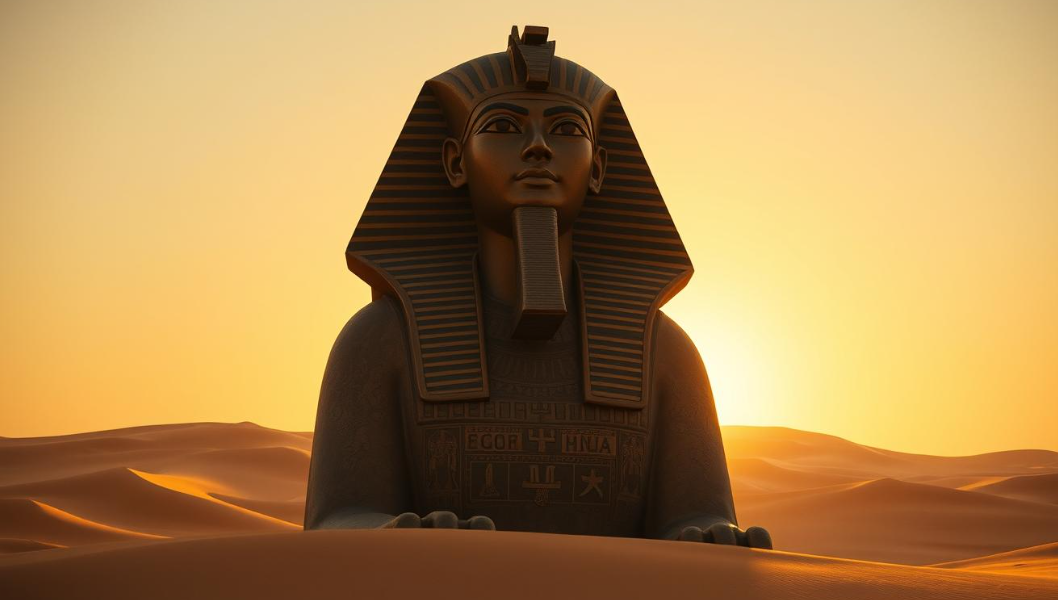
The Iconic Pharaohs and Their Colossal Monuments
The pharaohs of ancient Egypt were seen as gods on earth. Their huge monuments still amaze us today. The pyramids of Giza are a prime example of their greatness. They show the amazing skills and dreams of these leaders.
The Great Pyramids: Architectural Marvels of the Ancient World
The Great Pyramids, especially the ones at Giza, are a huge achievement. These huge buildings were tombs for the pharaohs. They were made to last forever, as the final homes for the rulers of ancient Egypt.
The biggest pyramid, the Great Pyramid of Khufu, is 481 feet tall and covers more than 13 acres. Its size and perfect design amaze experts. They praise the ancient Egyptians for their planning and technology.
“The Great Pyramids of Giza are not only architectural wonders but also serve as a testament to the ingenuity and resilience of the ancient Egyptian civilization.” – Renowned Egyptologist, Dr. Sarah Parcak
These huge monuments still draw visitors from all over, filling them with awe and wonder. They show the amazing work of the pharaohs and their people. The pyramids of ancient Egypt are a lasting sign of this great civilization.
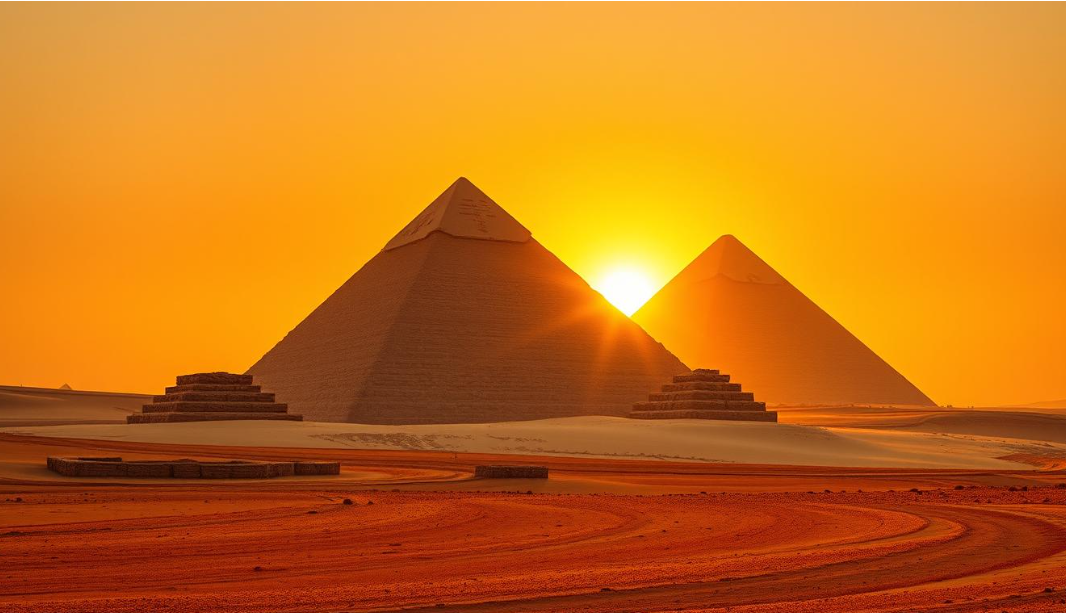
The Enigmatic Hieroglyphs and Their Decipherment
The ancient Egyptians were known for their skill in writing their history and beliefs. They used a complex writing system called hieroglyphs. These scripts were a mix of pictures and sounds, making them a mystery for many years.
The Rosetta Stone was a key discovery that helped crack the code of hieroglyphs. Scholars like Jean-François Champollion worked hard to understand these symbols. They finally figured out the meaning, giving us a peek into ancient Egypt and its government.
Deciphering the hieroglyphs was a big achievement. It showed us the depth of Egyptian culture and history. It also helped us understand the government of Egypt better.
“The hieroglyphic script of ancient Egypt is a true masterpiece of human ingenuity, a testament to the ingenuity and creativity of the Egyptian civilization.”
Learning about hieroglyphs has changed how we see ancient Egypt and its government. It opened a window into the complex world of this fascinating civilization. Scholars and fans are still exploring the mysteries of these ancient writings.
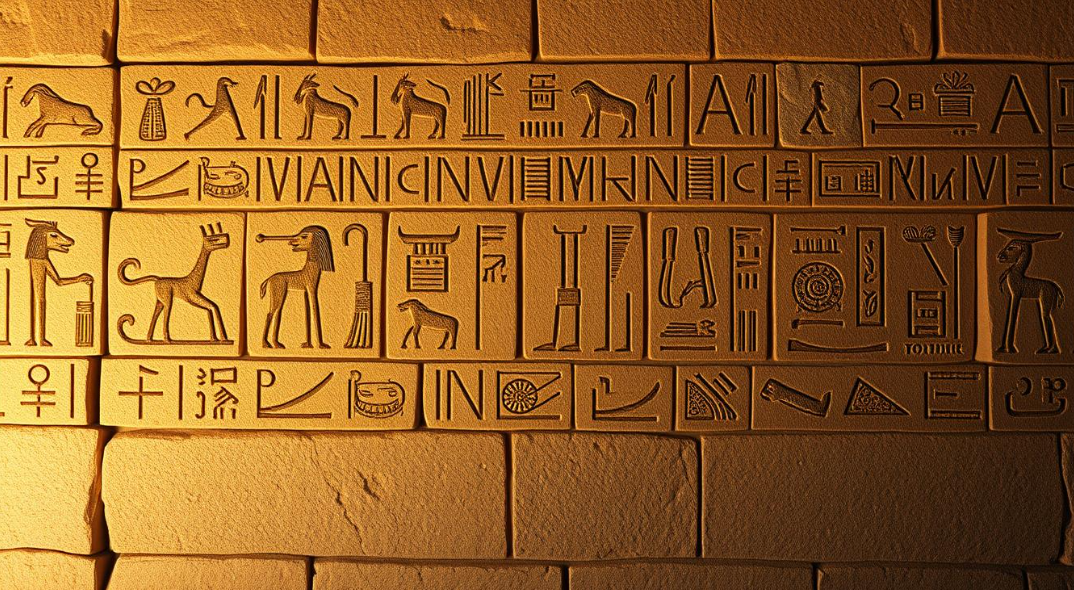
The Role of Religion in Shaping Egyptian Society
Religion was key in ancient Egyptian life, touching every part of it. At its core was a group of gods and goddesses. Each one had special traits and a big impact on people’s lives.
Exploring the Pantheon of Egyptian Gods and Goddesses
The Egyptians worshipped many gods, each with their own character and role. From Ra, the sun god and universe creator, to Anubis, the jackal-headed god of the dead, these gods were important to the people of gods of egypt.
Osiris, the god of the underworld and judge of the dead, is a famous Egyptian god. His story of death and coming back to life was key to their beliefs about the afterlife. Isis, his wife and Horus’s mother, was seen as a protector and nurturer.
These gods and goddesses were more than symbols; they were thought to really affect human lives and nature. The Egyptians had many rituals and offerings to keep a good relationship with them. This helped keep their society prosperous and stable.
The gods of Egypt were not just symbolic figures; they were believed to actively shape the course of human events and the natural world.
The lasting effects of this deep religious tradition are clear in the big monuments, detailed tomb paintings, and amazing artifacts. They show how the Egyptian gods deeply influenced their culture and identity.
Egypt: A Land of Diverse Cultural Influences
Egypt lies in the Middle East’s heart, a place where many cultures meet. It has been shaped by Mesopotamian, Nubian, Greco-Roman, and Islamic empires. This mix has created a rich cultural heritage.
Its location has been key to its history. Egypt connects Africa, Asia, and the Mediterranean. This spot made it a center for trade and sharing ideas and traditions.
The government of Egypt has worked hard to keep its culture alive. Since the early days, they’ve seen the value in protecting Egypt’s heritage.
Now, Egypt is a place where ancient wonders like the Pyramids and the Valley of the Kings still stand. Cities like Cairo and Alexandria show off modern Egyptian culture, mixing old and new.
“Egypt is a land of contrasts, where the echoes of the past resonate with the pulse of the present, creating a truly captivating experience for all who visit.”
As people around the world learn more about Egypt, they see its lasting impact as a place where cultures meet. It shows how creativity and resilience can last through time.
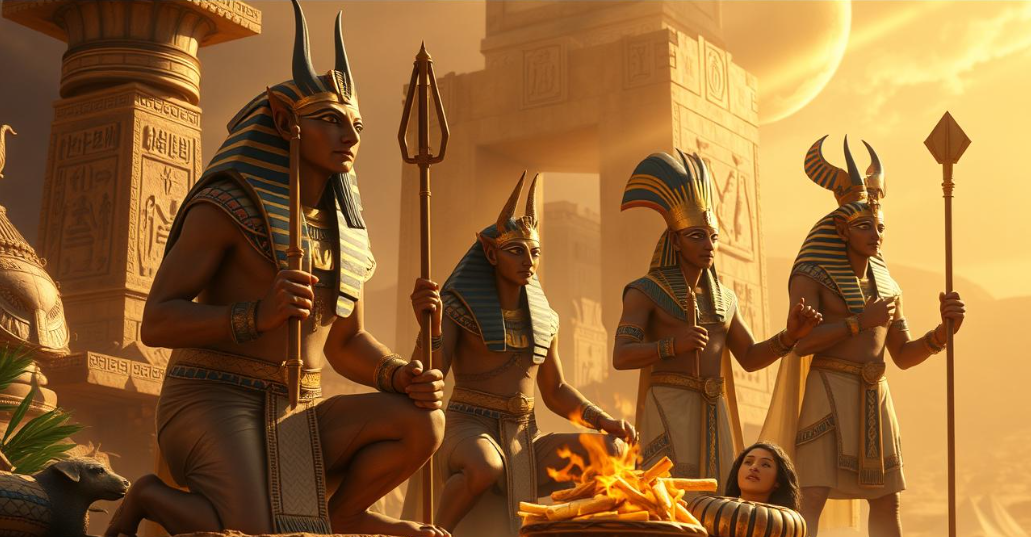
The Remarkable Achievements in Science and Technology
The ancient Egyptians were true pioneers in science and technology. They left a lasting legacy that still shapes our world today. They made big steps in medicine, astronomy, engineering, and more. Their work showed their amazing ability to innovate.
Advancements in Medicine, Astronomy, and Engineering
The Egyptians were known for their deep medical knowledge. They had advanced surgical skills, treating wounds, fractures, and even brain injuries. They also made big leaps in astronomy, mapping the stars and creating a very accurate calendar.
They showed their genius in engineering with the Pyramids of Giza. These huge structures are a sign of their architectural skill. They still amaze and inspire people everywhere.
| Field | Achievements |
|---|---|
| Medicine | Sophisticated surgical techniques, treatment of wounds, fractures, and brain surgery |
| Astronomy | Accurate mapping of stars, development of a precise calendar system |
| Engineering | Construction of the Pyramids of Giza, showcasing architectural mastery |
The ancient Egyptians’ work in science and technology has greatly influenced us today. It encourages us to explore the past and build on their discoveries.
“The Egyptians were the first people in the history of the world to make serious and effective use of the intellectual powers of man.”
– James H. Breasted, renowned Egyptologist
The Rise and Fall of Egyptian Dynasties
Egypt’s history is full of ups and downs, marked by powerful dynasties. These dynasties have left a lasting impact on Egypt’s culture and history. From the early days of unifying Upper and Lower Egypt to Cleopatra’s reign, Egypt has seen many changes.
The stories of these rulers and their struggles show the power of human will. They tell us about the strength of a civilization that has amazed the world for thousands of years. These tales are key to understanding the legacy of Egypt and its prince.
The Unification of Upper and Lower Egypt
The story of Egypt started with the unification of its two parts under the first pharaohs. This event created a strong kingdom that would go on to shape human history. It was a crucial moment for Egypt.
Dynastic Successions and Conflicts
Each dynasty that followed left its mark on Egypt. They faced power struggles and made big changes. Their stories are full of drama and intrigue, captivating everyone who reads them.
The Dramatic Reign of Cleopatra
Cleopatra’s reign was a turning point in Egypt’s history. Her story, mixed with the rise and fall of the Roman Empire, is a key part of Egypt’s tale. It’s a chapter that still inspires and fascinates us today.
| Dynasty | Ruling Period | Key Achievements |
|---|---|---|
| Old Kingdom | c. 2686-2181 BCE | Construction of the Great Pyramids, advancements in architecture and engineering |
| Middle Kingdom | c. 2055-1650 BCE | Expansion of trade and cultural influence, advancements in administration and the arts |
| New Kingdom | c. 1550-1069 BCE | Expansion of ancient Egypt’s military and political power, construction of iconic temples and monuments |
| Ptolemaic Dynasty | 323-30 BCE | Reign of Cleopatra, integration of Hellenistic culture, advancements in science and technology |
The rise and fall of Egypt’s dynasties have deeply influenced world history. They have shaped Egypt’s culture, politics, and society for thousands of years. From the early unification to Cleopatra’s reign, these stories continue to captivate and inspire us.
The Enduring Legacy of Egyptian Art and Architecture
The art and architecture of ancient Egypt still amaze us today. Their famous monuments, detailed tomb paintings, and huge statues show their creativity and skill. The sphinx and the colors on tomb walls tell us about the lasting impact of ancient Egyptians on culture. They inspire artists, architects, and history lovers.
From Colossal Statues to Intricate Tomb Paintings
The ancient Egyptians were known for their amazing skill. They made the iconic gods of egypt and beautiful tomb paintings. These artworks show the skill of Egyptian artists and give us a peek into their spiritual and cultural beliefs.
The huge statues of pharaohs and gods, like the Great Sphinx of Giza, were symbols of power and connection to the gods. These statues were carved with great care. They show the Egyptians’ deep respect for their gods and their ancient egypt culture.
The tomb paintings were also very beautiful. They showed gods, myths, and daily life. These paintings let us see into the world of ancient Egypt. They keep the stories and beliefs of this fascinating civilization alive for us today.
“The art of ancient Egypt has a timeless quality, capturing the essence of a civilization that continues to captivate and inspire people worldwide.”
The art and architecture of Egypt show us the lasting spirit of this amazing civilization. They fill us with awe and wonder at their timeless creations.
The Influence of Egypt on Modern Popular Culture
The mystique of ancient Egypt still captures our imagination today. It shapes many parts of popular culture. From the hit movie “The Prince of Egypt” to our deep interest in Egyptian mythology, its legacy lives on in our dreams.
The film “The Prince of Egypt” is a key example of Egypt’s impact. It tells the Exodus story in a way that’s new and exciting. It introduces us to the gods of Egypt and the ancient kingdom’s grandeur. The movie’s amazing animation and story have made it a classic, sparking a fresh interest in Egypt‘s culture.
Egypt‘s charm also reaches into books, music, and art. The detailed hieroglyphs and the gods of Egypt have inspired many. People wonder what time is it in Egypt?, drawn to the mystery of this timeless place.
Egypt‘s lasting effect on today’s culture shows its lasting power. Its history, stunning buildings, and myths still move and amaze us. This ensures Egypt‘s legacy will keep shaping our culture for years to come.
“The gods of Egypt have cast their eternal spell upon the world, their influence stretching far beyond the sands of time.”
Exploring the Ancient Treasures: Museums and Archaeological Sites
For those drawn to ancient Egypt, a world of discovery is waiting. The Egyptian Museum in Cairo and the Giza Plateau offer a glimpse into this ancient civilization.
The Egyptian Museum is filled with ancient Egyptian treasures. It has a vast collection that spans thousands of years. Here, you can see mysterious mummies, read ancient texts, and admire huge monuments that have amazed people for centuries.
Outside the museum, the Giza Plateau shows off ancient Egypt’s architectural skills. The Great Pyramids, standing tall by the Nile, still amaze and intrigue visitors. They invite us to learn about their creation and the people behind them.
Luxor and Aswan are other places in Egypt that take you back in time. New discoveries are still being made, giving us a closer look at this ancient civilization. This civilization once thrived on the African continent.
“The urge to explore the unknown, to understand the world, to seek the truth, is a very powerful drive in human beings.”
Unveiling the Secrets of Egypt’s Past
The wonders of ancient Egypt still amaze and inspire us today. By learning more about this civilization, we gain a deeper respect for their creativity, strength, and cultural depth. This appreciation comes from the land of the Nile.
Conclusion: Egypt’s Lasting Impact on World History
Egypt’s history has deeply influenced human civilization. The pyramids and hieroglyphs show its lasting impact. This ancient land has given us a rich legacy that still inspires people today.
Egypt’s architects and scientists showed great ingenuity. Their art and culture have shaped the world. This has left a mark that we can still see today.
Exploring ancient Egypt reveals timeless lessons for us. The gods like Ra and Anubis have influenced popular culture. Films like “The Prince of Egypt” and myths tell their stories.
Technological advances in medicine and astronomy also come from Egypt. These discoveries help us understand the world better.
The legacy of ancient Egypt goes beyond time and space. It touches our hearts and minds. The monuments and artifacts remind us of human potential.
As we learn more about Egypt, we see its lasting impact. Its influence will inspire us for many generations. It encourages us to explore our own culture and achievements.
FAQ
FAQ
What is the significance of the Prince of Egypt?
The Prince of Egypt tells the story of Moses and his role in leading the Israelites out of Egypt. It’s a film that brings ancient Egypt’s history and myths to life. It has stunning visuals and a story that grabs the audience.
What continent is Egypt located in?
Egypt is in Africa, in the northeastern part of the continent.
What is the current government of Egypt?
Egypt is a semi-presidential republic. It has a president and a prime minister. President Abdel Fattah el-Sisi leads the government now.
What are some of the ancient Egyptian gods and goddesses?
Ancient Egypt had many gods and goddesses. Some famous ones include Ra, the sun god, Anubis, the god of the dead, Isis, the goddess of magic, and Bastet, the goddess of cats.
What time is it currently in Egypt?
Egypt is in the Eastern European Time Zone, 2 hours ahead of UTC+2. The time in Egypt changes with daylight saving time.
What were some of the major achievements of ancient Egyptian civilization?
Ancient Egypt was known for its big achievements. They made huge steps in architecture, engineering, medicine, astronomy, and math. Building the pyramids, improving farming, and creating hieroglyphics are just a few examples of their great work.
How did religion shape ancient Egyptian society?
In ancient Egypt, religion was a big part of everything. It influenced politics, daily life, and culture. The many gods and goddesses played a big role in their beliefs and traditions.
Share this content:

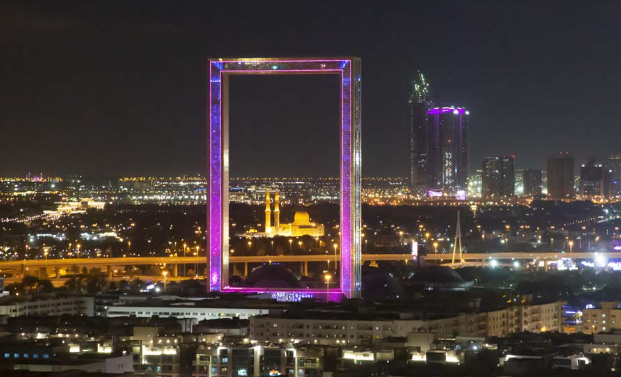












2 comments